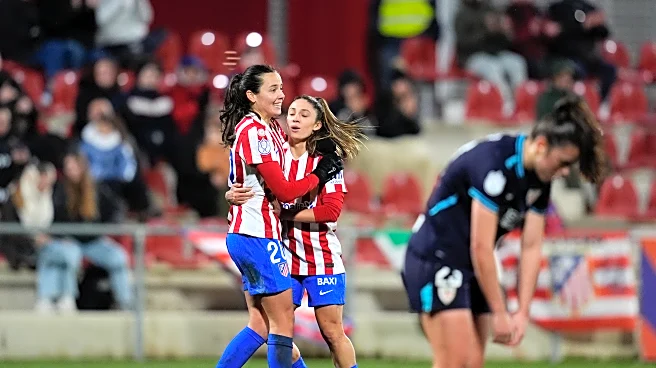What's Happening?
Bryson DeChambeau has expressed his desire to participate in a PGA Tour event to prepare for the 2025 Ryder Cup, despite the ongoing conflict between LIV Golf and the PGA Tour. United States captain Keegan Bradley has suggested that American players in the Ryder Cup picture should compete in the Procore Championship, a PGA Tour event. DeChambeau, who is aligned with LIV Golf, faces challenges due to the rivalry between the two golf tours. He has stated that LIV officials are willing to let him participate, but the decision ultimately rests with the PGA Tour. DeChambeau's alignment with LIV Golf has led to consequences, including potential exclusion from PGA Tour events.
Why It's Important?
The situation highlights the broader implications of the ongoing rivalry between LIV Golf and the PGA Tour, affecting players' ability to prepare for major events like the Ryder Cup. The conflict has already impacted team dynamics, as seen with Henrik Stenson losing his captaincy for Team Europe and Jon Rahm's uncertain qualification status. The standoff could influence the composition and performance of the U.S. team, potentially affecting their competitiveness in the Ryder Cup. The decision by the PGA Tour regarding DeChambeau's participation could set a precedent for future interactions between the two tours.
What's Next?
The PGA Tour's decision on whether to grant DeChambeau a sponsor's exemption for the Procore Championship will be crucial. If allowed, it could ease tensions and facilitate better preparation for the Ryder Cup. However, if denied, it may further strain relations between LIV Golf and the PGA Tour, impacting players' readiness and team cohesion. Stakeholders, including players and tour officials, will be closely monitoring the situation, as it could influence future collaborations and negotiations between the tours.
Beyond the Headlines
The conflict between LIV Golf and the PGA Tour raises ethical questions about player autonomy and the consequences of aligning with rival organizations. It also reflects broader trends in sports where financial incentives and new leagues challenge traditional structures. The outcome of this situation could influence how sports organizations manage rivalries and player participation in the future.










